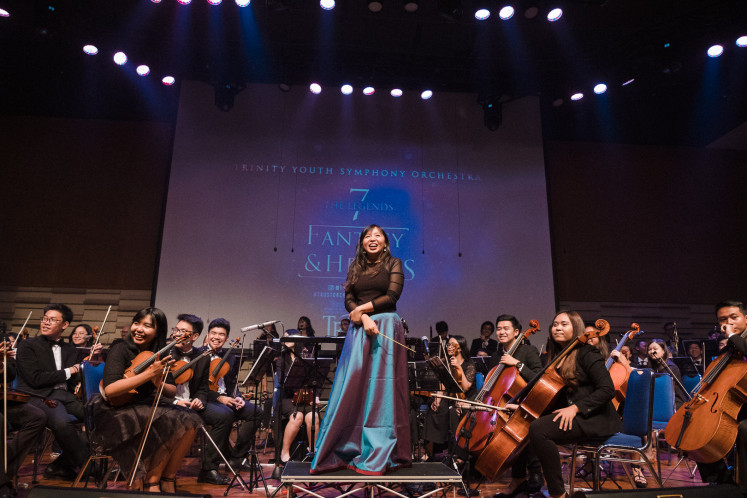Popular Reads
Top Results
Can't find what you're looking for?
View all search resultsPopular Reads
Top Results
Can't find what you're looking for?
View all search resultsNotes of desperation: Pandemic exacerbates struggles of Indonesian musicians
The job drought experienced by Indonesia’s working musicians during the pandemic shows the lack of support the country’s creative workers have always had.
Change text size
Gift Premium Articles
to Anyone
A dreadful new normal
For many freelance/session musicians, performing is at the heart of their occupation. Without opportunities to showcase their art form, the essence of their music feels lost.
Nathania Karina, D.M.A, M. Mus, is a pianist who, on top of performing, conducts the Trinity Youth Symphony (TRUST) Orchestra and teaches piano. In 2019, TRUST put on over 15 performances. Before the pandemic struck, on average, they did 10 to 15 major concerts per year.
“Believe it or not, in 2020 [we had] zero live performances,” said Nathania.
Alongside guitarist and music producer Christofer Tjandra, Nathania founded Music Avenue, a music entertainment company. Ahead of quarantine, they would get as many as eight bookings to perform at weddings each month. During past peak seasons, they have even had upwards of four bookings a week.
But now, Christopher says, “there are still weddings, but they are fewer in number. The parties are also smaller because of the [COVID-19 protocol]. Now, only 30 people can [attend weddings].”
Fewer parties: Christofer Tjandra used to play tens of weddings a month, but the number has dwindled drastically since the pandemic. (Personal Collection/Courtesy of Christofer Tjandra)Throughout the majority of the pandemic, Music Avenue has only gotten one to two gigs per month. These gigs are usually smaller performances. Whereas usually, they could have as many as 20 musicians for a booking, now customers only request one to three musicians.
Christofer has a theory of why this is so: “Maybe the client is thinking there's no point having live music [when there are so few guests]?”
Coping through other “pockets” of income
Given the current safety measures, for musicians based in Indonesia, live performances seem to be out of the question. Musicians have had to find other sources of income to sustain themselves.
Nathania advises that, “Being a musician, our [mindset] cannot be ‘oh I just wanna play’, which I think is very risky.” She feels grateful that people generally already know her within several “pockets of income”, whether as a conductor, teacher or songwriter. However, Nathania acknowledges that this might not be the case for many other musicians who might have just focused on performing.
She notes, “It's very hard if we are only performing before the pandemic and then suddenly have to switch to [other sources of income such as] teaching. To teach, you need a certain reputation and method. These cannot come overnight – people need to know you as a teacher.”
As a new source of income, Nathania has published a music book in three volumes titled, Childhood Series: Memories, Dreams, Adventure. Moreover, although teaching piano online was not previously an option for her, Nathania has now used it to her advantage.
She states, “Now, I can have students in the United States, Australia, Surabaya and Bandung. It’s pretty amazing.”
Christofer has also looked into other sources of income related to music. He finds himself spending more time in his home studio producing songs for music organizations such as Symphony Worship and solo artists such as Arvi Josh.
Outside of music, he has also created a new Kicks Bag product, a bag for shoes that he sells via online marketplaces such as Tokopedia and Shopee.
Fans as well
Beyond musicians, the lack of live music has been far harder than the fans thought it would be. It turns out that the human connection concerts evoke goes much further than mere entertainment value.
Prior to the pandemic, 17-year-old Erin Michelle was a regular attendee of classical orchestra concerts. The last live performance she watched was an exuberant string quartet recital at Balai Resital Kertanegara, a concert hall in South Jakarta. Unfortunately, ever since quarantine started in March 2020, she has only watched classical performances through virtual platforms, whether it be YouTube live streams or Zoom recordings.
For Erin, as it is for many other music fans, the online experience is far less fulfilling. She says, “If you watch the performers in-person, it feels real. [But] if you attend a Zoom recording, you might as well just search online for YouTube recordings of the piece.”
The post-pandemic music problem
Needless to say, the music world has undergone substantial changes due to the changing landscape of performances.
Christofer says that, “Now, the culture is more ‘do it yourself’: learning how to edit videos, how to record videos.” This is where a significant problem arises. Group performances, such as those in an orchestra setting, are the result of collaborations between a myriad of musicians. It just is not possible for everyone to ‘do it themselves.’ As a result, the transition to online performance has been detrimental to freelance players who have found it challenging to adapt.
Nathania explains, “Most of the players do not have a yearly contract to stay within an orchestra. Most of them, even if we talk about the Jakarta City Philharmonic [the official orchestra of the city of Jakarta], are not paid based on a contract, but as freelancers.”
Helping out other musicians: Nathania Karina founded Music Avenue, a music entertainment company. (Nathania Karina ) (Personal Collection/Courtesy of Nathania Karina )The freelance musician culture in Indonesia is especially ubiquitous.
Nathania poses a relevant question, “If everyone is a freelancer, how are they going to survive?” She further elaborates that overseas musicians are not hired as freelance musicians anymore. They are given contracts that often include medical insurance. On the other hand, freelance musicians do not receive benefits such as insurance that is increasingly important for the modern worker.
“We need to revolutionize this. Especially in Indonesia, the culture is that being a musician is not [considered] a serious job,” Nathania emphasizes.
While we ponder the fate of musicians in Indonesia, Adhar Lukman, a horn player, offers words of hope.
He evokes a saying attributed to Indonesian national hero Kartini, “I'm sure that setelah gelap, terbitlah terang [after dark, there will be light] for music in Indonesia, regardless of the type and genre. It will definitely be victorious again after this pandemic ends. For my fellow musician friends, keep the spirit up, and let's continue to pray for Indonesia to be healthy, [so that the] condition will return to normal soon.”













